Why Is Community Engagement Important?
Why is community engagement important? In this article we will explore the answer to that question by addressing the many personal development and community growth benefits that come from you being involved in your community.
But let’s also answer a related question…What Is Community Engagement?
The broad goal of community engagement is to positively impact the well-being of the people and/or causes represented by the community group. The personal goal of community engagement is your own personal growth and development.
Community life is also one of 12 important aspects of a balanced life. Finding a way to give back to your community, and be a part of the people and places that make up your community is a great way to find fulfillment and value in your life.
Community engagement is the process of you working collaboratively with groups of people in your community, often as a volunteer. Those groups can be schools, parks and recreation, churches, political organizations, animal shelters, youth clubs, senior citizen homes, and more. We will look at ways you, or anyone else, can be engaged with your community in a meaningful and intentional manner.

Community engagement can begin at any age. There are opportunities for the very young as well as senior citizens. Anyone can, and should, volunteer in their community for a variety of reasons. Therefore, we will answer the question, Why Is Community Engagement Important?
Why Is Community Engagement Important?
Let’s look at the benefits of community engagement from different perspectives. There are several categories of benefits that we will explore. Then we talk about community engagement examples.
- Intellectual
- Personal Growth and Development
- Social
- Policy-Making
- Sustainability
- Relationship
You will find benefits that overlap categories but the many benefits of community engagement will be clear and undeniable.
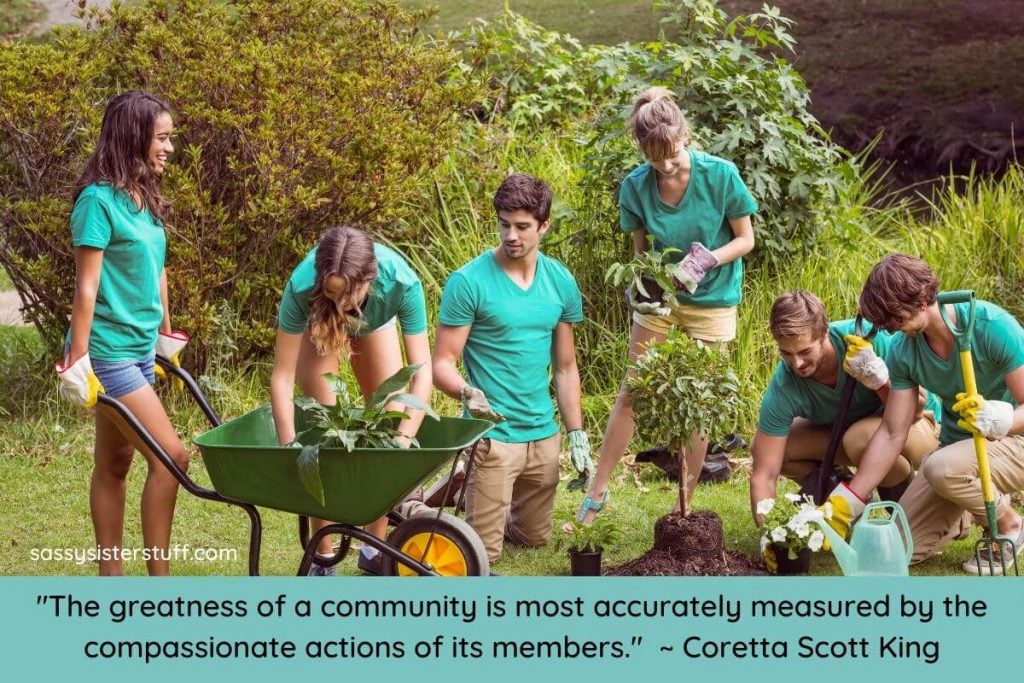
Intellectual Benefits
Community engagement impacts people by helping them develop complex understandings of situations, problem analysis skills, problem-solving skills, critical thinking, and deep cognitive skills.
People who are engaged in their community have an improved ability to understand complexity and ambiguity. Their intellectual knowledge-base and wisdom grows.
Personal Growth and Development Benefits
Community engagement helps individuals develop a greater sense of personal efficacy, personal identify, spiritual growth, and moral development.
They also develop better interpersonal skills, especially the ability to work well with others. And, they build leadership and communication skills.
People who are actively involved in their community may also discover a particular interest they have in pursuing a career.
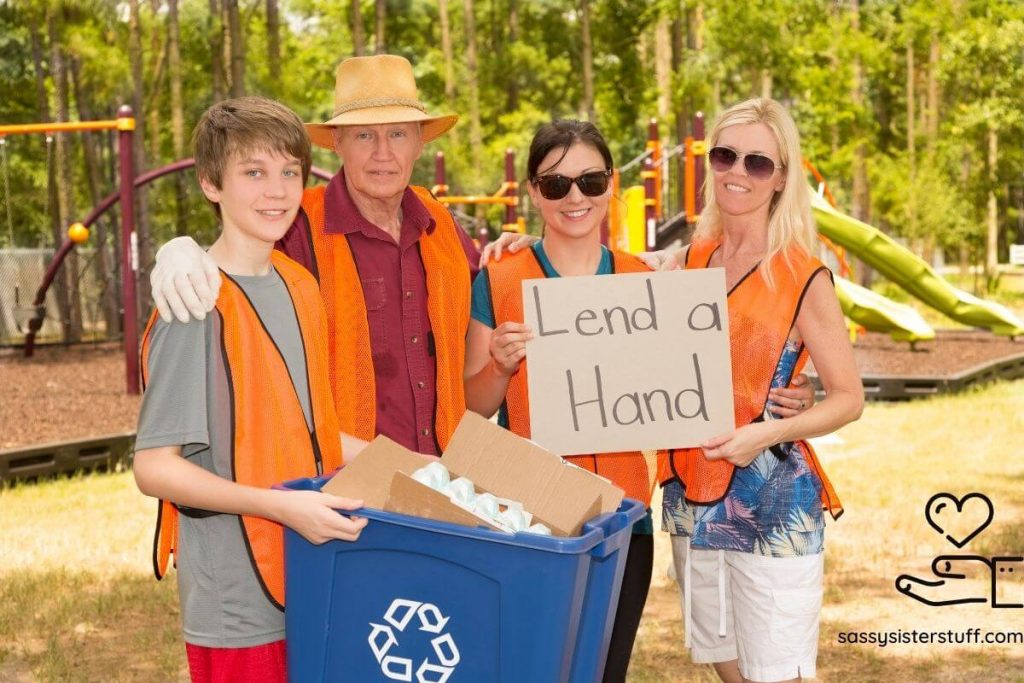
Social Benefits
People who are out in their community, actively engaged with groups of people who have a common interest, learn to have fewer stereotypes of people and a greater understanding of cultural differences.
They develop a greater sense of social responsibility and citizenship skills. They usually carry these attributes through life into other activities.
They also learn to accept and appreciate differences.
Pin to Pinterest for Later
Policy-Making Benefits
People who volunteer with community organizations learn how public participation can significantly influence decision making that directly impacts the community. Active, passionate volunteers can influence decisions related to provisions of community services and future visions for the community.
Community involvement in government or advocacy organizations encourages policy-makers to develop meaningful solutions to complex problems. Citizen involvement and engagement encourages policy-makers to have open dialogue, with active listening, about decisions that have to be made in the best interest of the community.
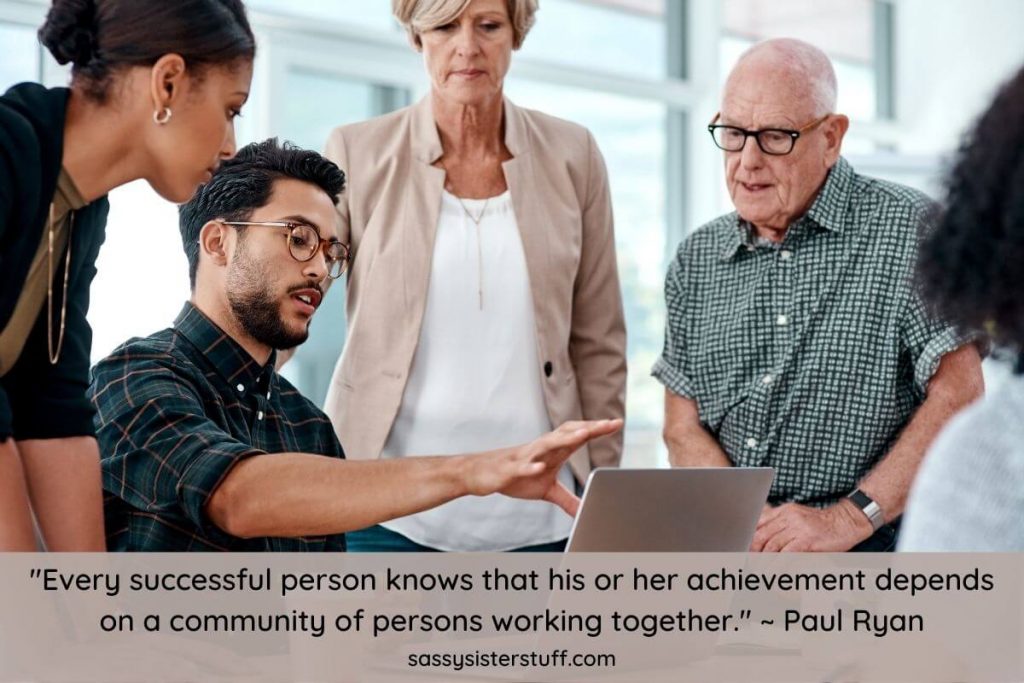
Sustainability Benefits
Community engagement supports the sustainability efforts of organizations to look into the future and plan accordingly for both their community organization and the broader community. Decisions can be made based on real-life experiences of community members who can share local knowledge and input.
This collaborative relationship between organizations and citizens ensures the sustainability of the community in a manner that supports its citizens and the environment.
Relationship Benefits
Community engagement encourages positive relationships between citizens and organizations that have a common interest — their community. Those involved in working together learn the joys and challenges of developing a relationship that has meaning and richness. They also learn the delicate balance involved in building trusting and collaborative relationships that are impactful and effective.
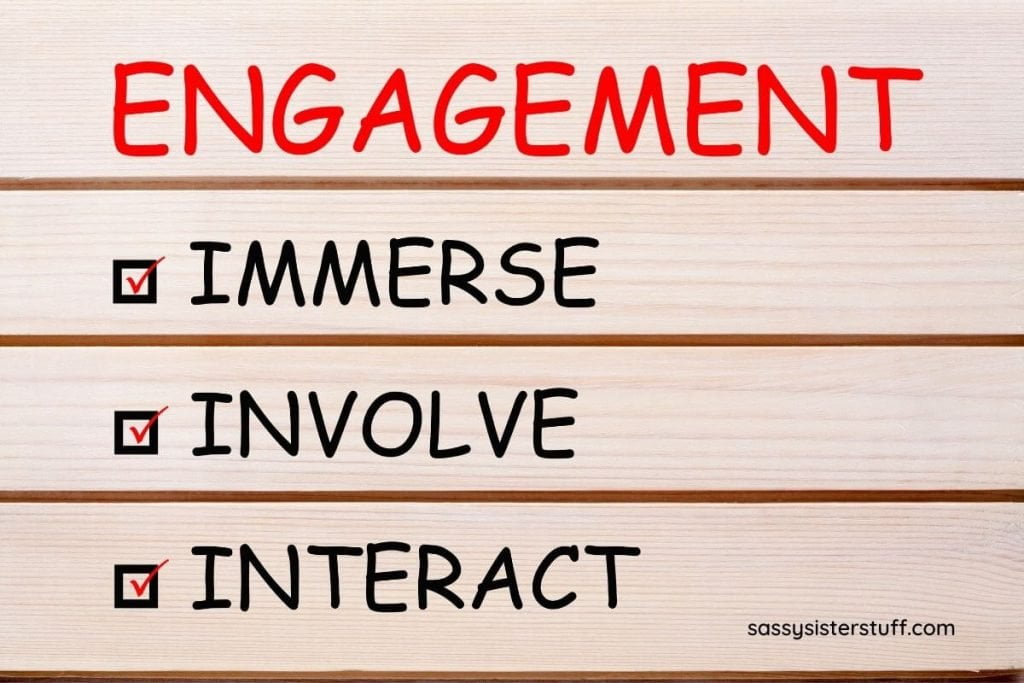

Let’s Review: Importance of Community Engagement
Why is community engagement important? As you can see, there are many community engagement benefits for both the community organization and the individual who is volunteering. It’s truly a win-win situation for everyone.
Before we continue, I would like to share some other terms that are related to community engagement. You may hear people refer to their involvement in the community as them being a community volunteer. Or you may hear any of these terms used for more formal acts of community engagement that often involved many citizens of the community:
- community participation
- community involvement
- contribution from the community
- stakeholder involvement
- community outreach
- civic engagement
I think of community engagement as an over-arching word that describes all of those terms, and more. If you are actively involved in your community, and making a difference, then you are engaged in your community.
And you are benefiting from the joys (and yes, sometimes the frustrations) of knowing that you are making a difference to your community and growing as a person because of your actions.
For the remainder of this article, I am going to focus on opportunities in your community to volunteer and be involved in your community so you are making a difference!
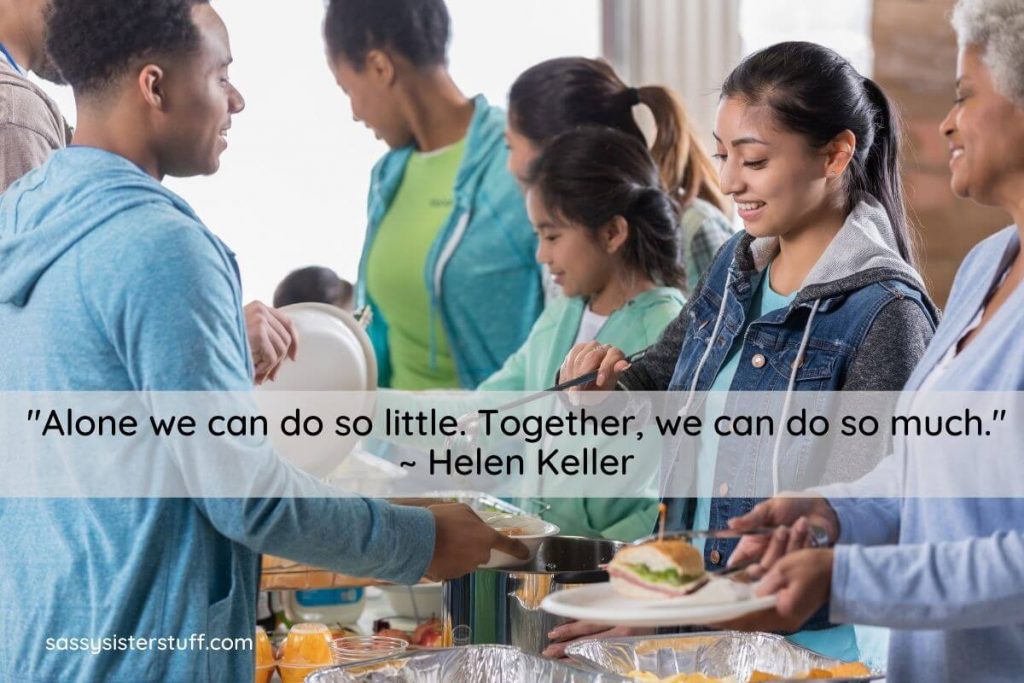
Types of Community Engagement
Why is community engagement important? Participating in the community is clearly beneficial in many ways. But did you know there are studies that have actually categorized community engagement into 8 areas of service? For informational purposes before you move on to the next section, these are the 8 categories:
- Community Building
- Community Education
- Community Organizing
- Deliberative Dialogue
- Direct Service
- Economic Development
- Engaged Research
- Institutional Engagement
You can read more about these 8 types of community engagement on the University of Minnesota Morris website.
In the next section, I have included community engagement activities from most of the categories. Don’t wonder why is community engagement important anymore… just go out and get involved! Be engaged in your community! Make a difference and have fun!
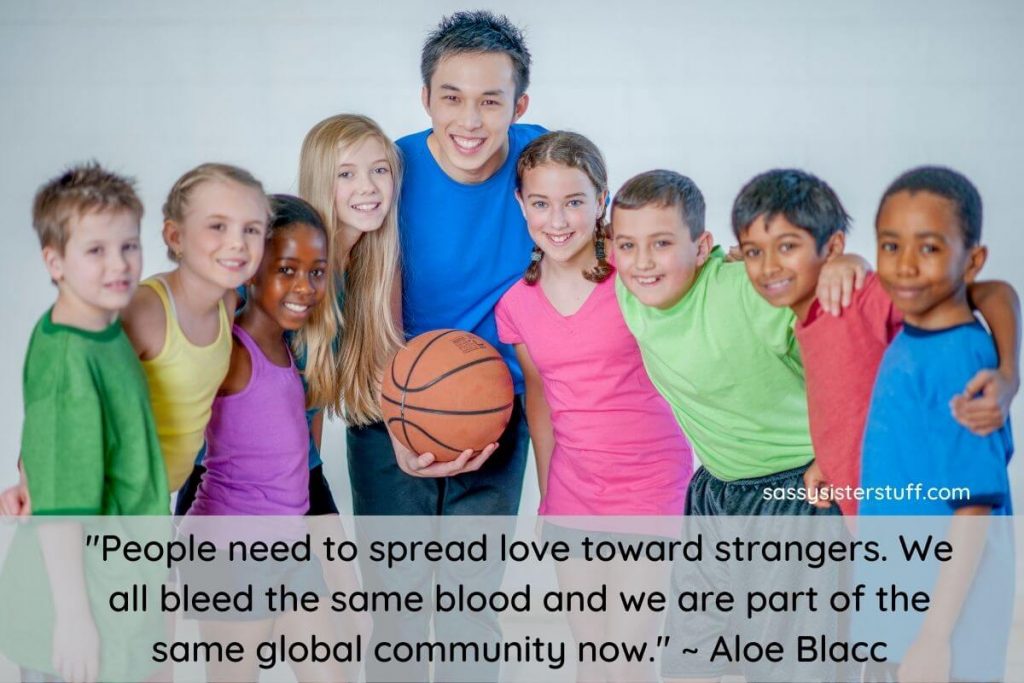
39 Ways to Volunteer in Your Community
These are ideas for adults who want to be engaged in the community. The list includes a variety of ways you can be involved and have an impact on the people around you.
1. Serve as a community liaison on a community advisory board for your local hospital or physician’s office.
2. Drop into your local library on the way home from work one day a week to help children select books.
3. Create a monthly newsletter for your child’s teacher or school from your home and prepare it to be distributed.
4. Serve as a coach or team mom for the local sports club.
5. Serve on the board of the local advocacy group that supports teachers and parents of children with disabilities.
6. Help the local church organize and distribute food from their food bank.
7. Transport animals from the local animal shelter to/from foster homes for people who cannot get there before they close.
8. Help at the local animal shelter — walk dogs, play with cats, clean cages, etc.
9. Volunteer at the local women’s abuse shelter to help the children with homework in the evenings.
10. Organize a holiday toy drive for a family in need.(You can usually do this through a school or church.)
11. Visit with local residents who are shut in their homes once a week.
12. Transport local residents who do not have transportation to doctor appointments or the grocery store.
13. Grocery shop for an elderly neighbor once a week.
14. Rake leaves or cut grass for someone who has recently had surgery or health issues.
15. Take someone to their chemo treatments and sit with them if they are alone.
16. Volunteer to work with at-risk children who are struggling with their schoolwork at the local school.
17. Contact the local hospital, nursing home, and heath department to see what help they need and support them.
18. Serve as the commissioner for the sports program in your local boys and girls club.
19. Organize and distribute uniforms for the local youth club.
20. Lead a youth group for teenagers at your local church.
21. Organize clean-up projects at the community park or local school.
22. Prepare and take meals to local shut-ins who don’t have family to help.
23. Clean out the closets in your home and donate clothes to the local homeless or women’s shelter.
24. Organize a social hour after church on Sundays.
25. Get involved in your local fire and rescue organization.
26. Organize a community building activity in your neighborhood (like a potluck dinner or scavenger hunt).
27. Join the local community college advisory or outreach board.
28. Create and moderate a social media support group for local residents who have similar interests and are interested in online engagement about the community.
29. Organize outings for community members once a month.
30. Work with your local commissioners to plan a focus group that provides helpful information for their decision-making.
31. Make simple Covid masks and distribute to local schools or hospitals.
32. Teach children your hobby at an afternoon club once a week at the local school.
33. Start a podcast about your community for the citizens.
34. Volunteer for service with the local PTA, Girl Scout, Boy Scout, or other organization.
35. Volunteer to lead a student government organization at the local school.
36. Support your local civic organization by helping to organize the voting process.
37. Start and lead a community action group for citizens who want to discuss issues that need to be addressed.
38. Serve as a board member on your home owners’ association.
39. Create a website about your community that includes citizen submissions of photos and essays.
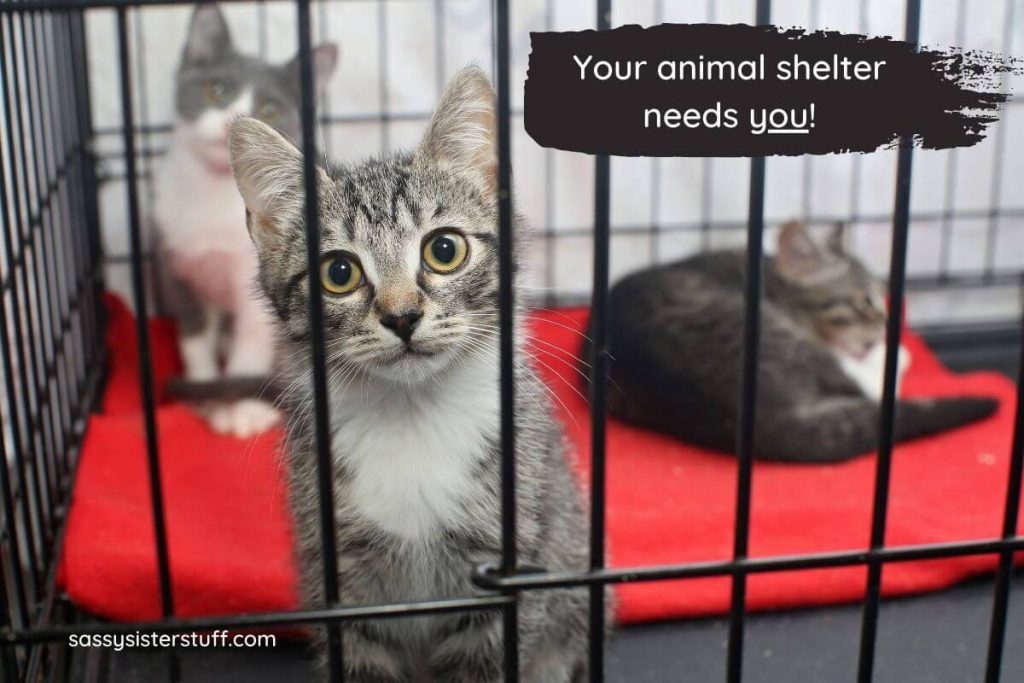
Final Thoughts: Why is Community Engagement Important?
I’ll close with just a few summary statements:
1. The importance of community engagement can seem subjective; but as you have just read, there are many benefits to being active in your community.
2. Participating in the life of your community is good for your personal development and well-being because it helps you become more connected to other people.
3. Community engagement is an important process that takes place in a community to understand the needs and wishes of the population and provide for those needs and wishes. It involves local organizations, businesses, governments, educational institutions, and other stakeholders (aka: the citizens who live there).
4. Community engagement is important because the collaborative efforts benefit both individuals and communities. The benefits of community engagement are social connections, shared goals, and stronger neighborhoods.
5. Engagement helps individuals feel like they’re part of something bigger, which has a positive impact on confidence and happiness.
6. Engagement also provides common ground for different perspectives, which can help to find new solutions that are focused on the needs of the people rather than those in power.
Given ALL the benefits of community engagement, I hope you will consider finding time to get involved and make a difference. I’m sure you’ll enjoy the experiences. Community Engagement Matters!
Love to All! ~ Susan








